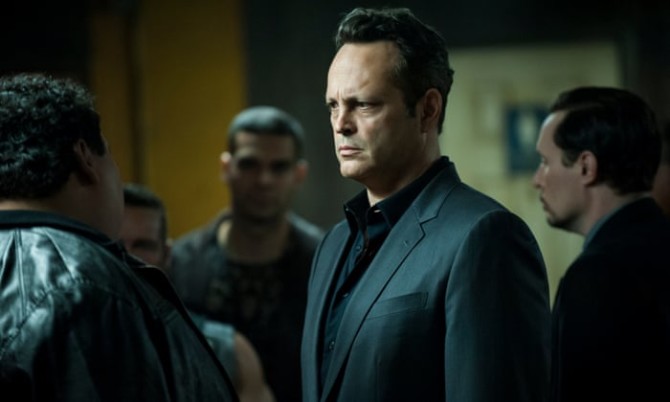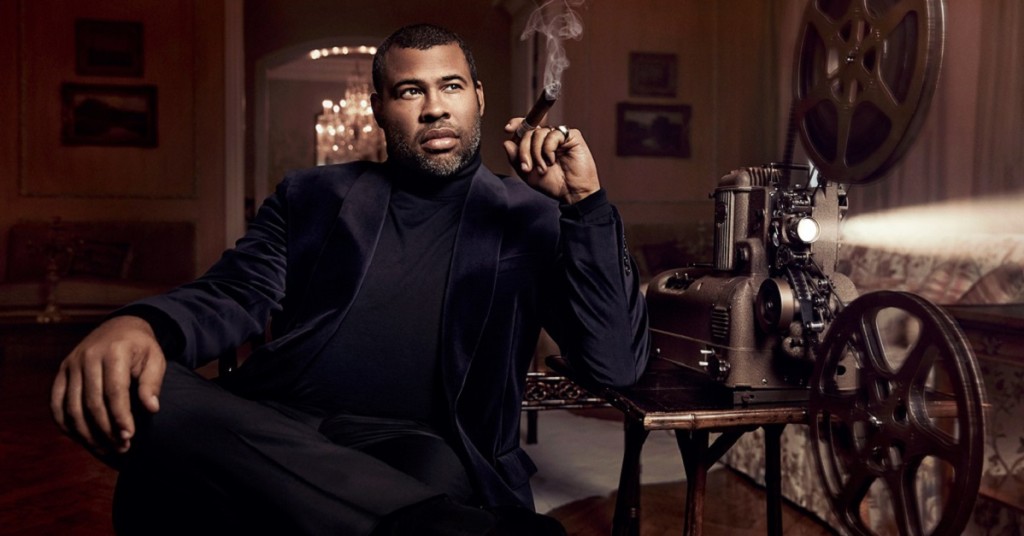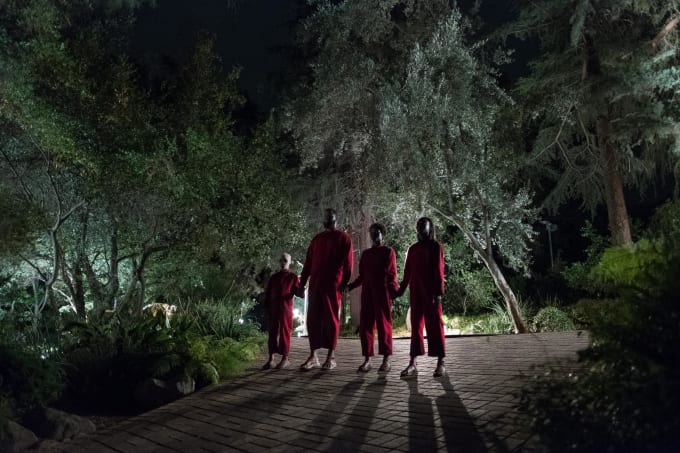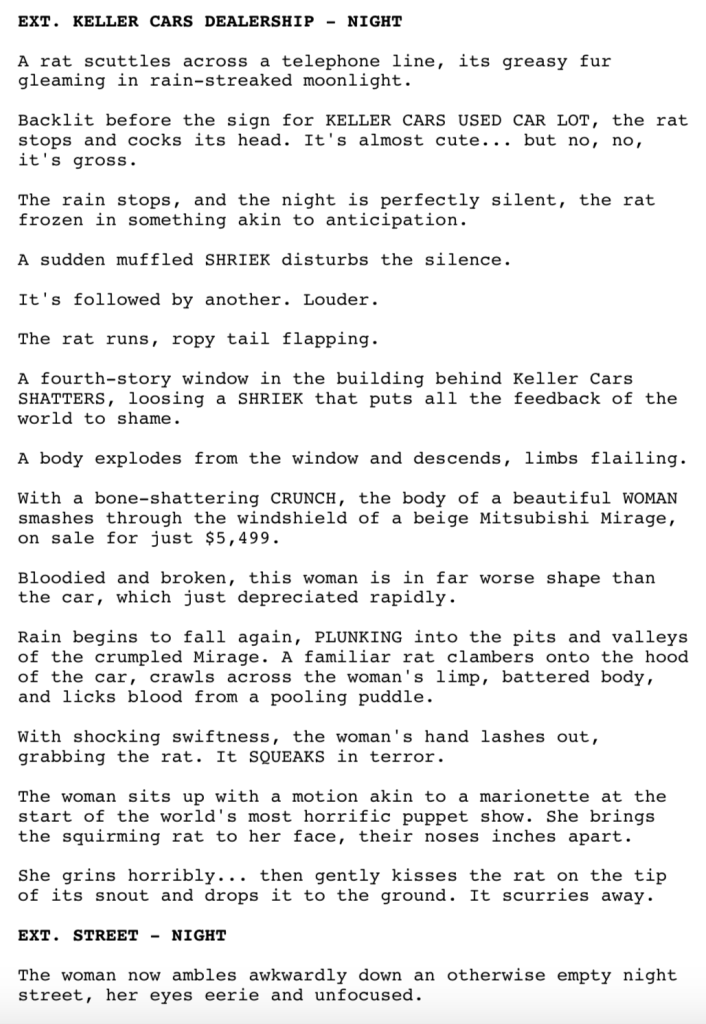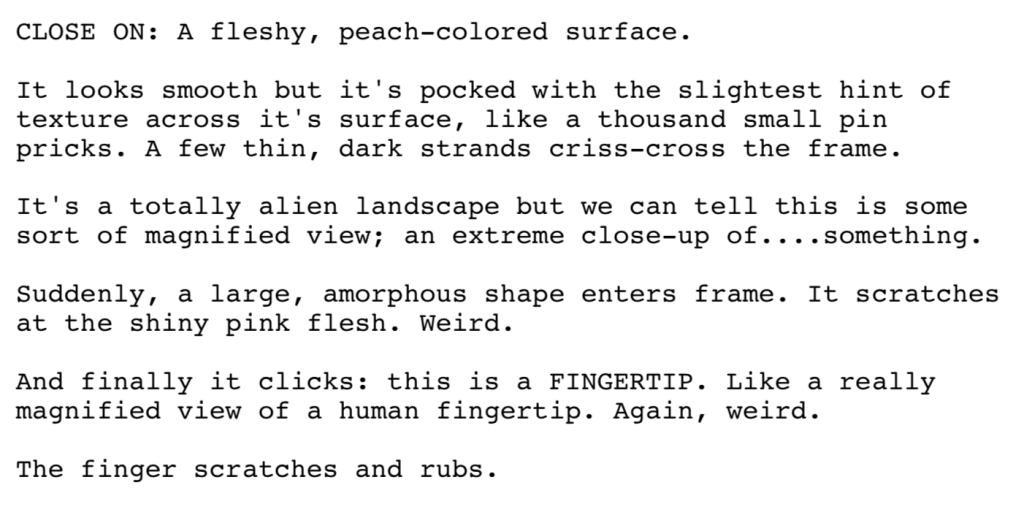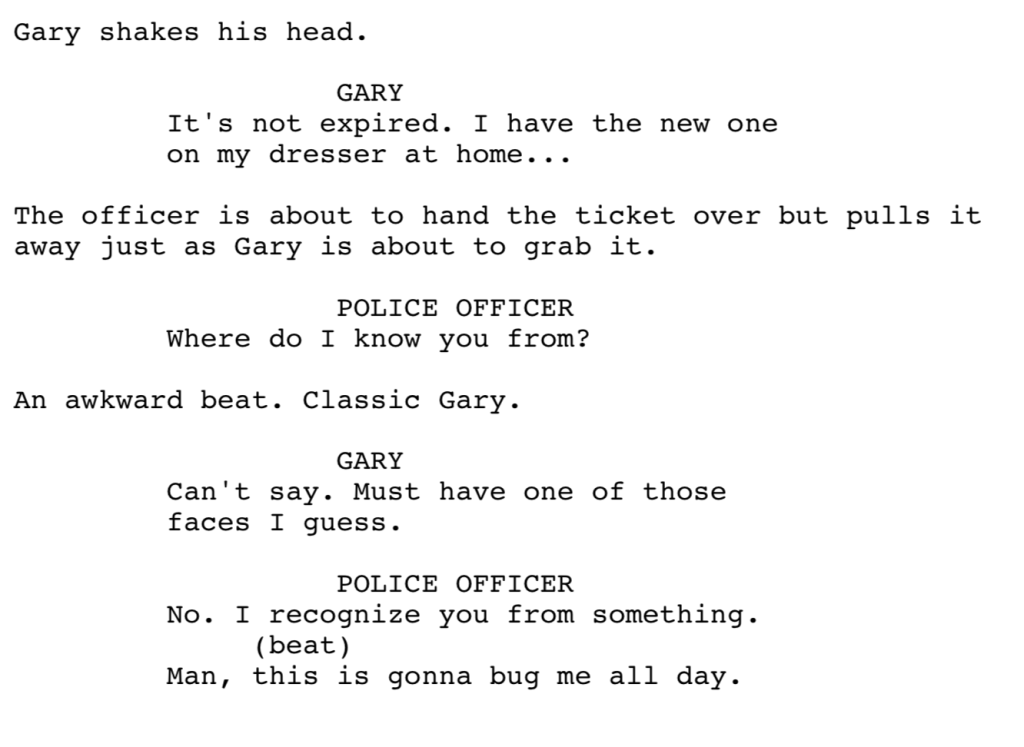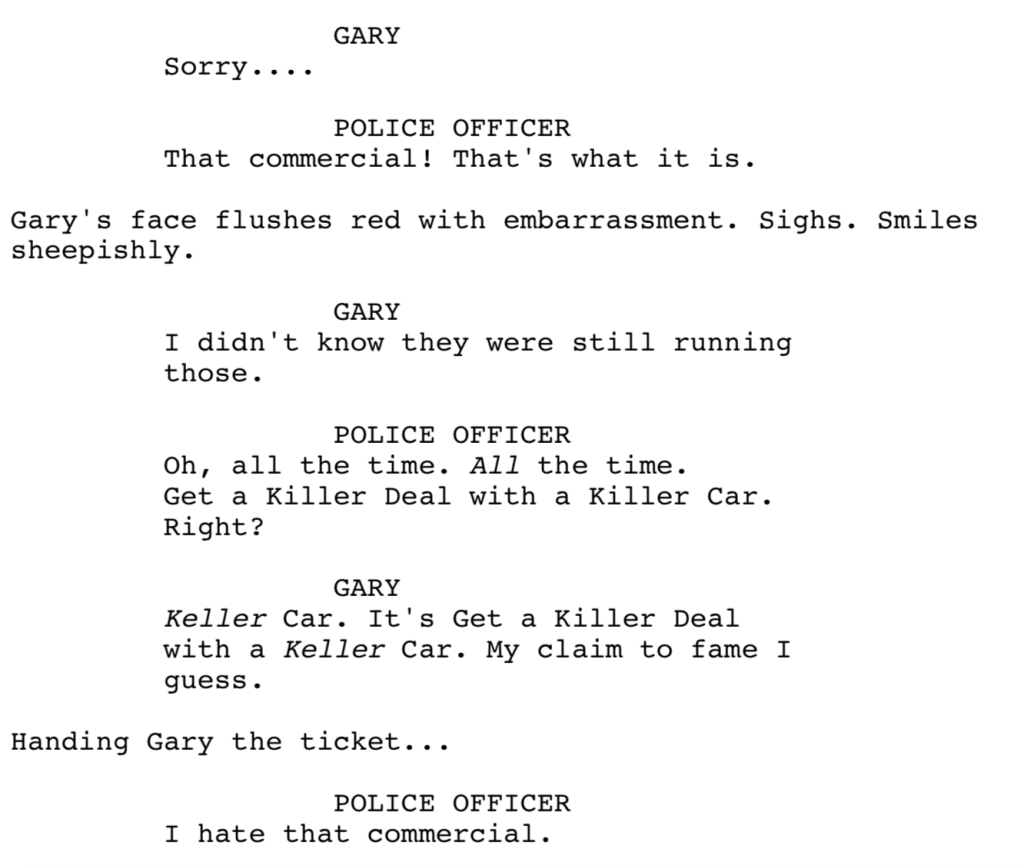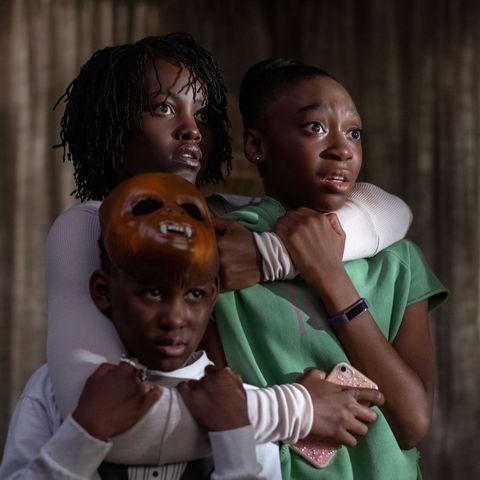Genre: Thriller/Sci-Fi
Premise: (from Black List) When a man’s estranged wife gets lost inside of her own mind during an experimental procedure, he must navigate her subconscious to find her in the memories of their past.
About: Brett Treacy and Dan Woodward are new writers. They finished top 100 in 2017’s Launch Pad competition with a script called Trapline. Then last year they made the leap to the big time – the Black List, grabbing a respectable 14 votes. Brett Treacy was a production assistant on Westworld.
Writer: Brett Treacy & Dan Woodward
Details: 120 pages
There I was, 15 pages into In Retrospect, sweating bullets for the writers. In theory, these ideas are goldmines. They’re high concept. They’re exciting. They feel like a movie. In practice, they’re nightmares. I can confirm this from my own experiences as well as from reading similar scripts from other writers.
The problem lies within the rule set that governs the script’s mythology. The disparity between what you believe writing the script will be like (fun!) and what it’s actuality like (misery!) is so much bigger than anticipated, it gives way to a sort of surrender as the writing process goes on. It’s never fun when you realize a script is going to take five times as much effort as you anticipated. What am I talking about? Read on.
James, a photographer, gets a call from a mysterious scientist who says he needs him to come immediately. James’ ex-wife, Sloane, is in trouble. James arrives at Vicaricorp where he’s whisked into a room to see his wife is in a coma. They explain to James that Sloane was part of a cutting-edge memory experiment to cure Alzheimer’s and that something went wrong. As James is Sloane’s emergency contact, he’s the only one legally able to help them. So what do you need me to do, he asks. We need you to go inside your wife’s memories and bring her back.
Before James even knows what that entails, he’s placed in a coma and linked to Sloane. The memory operational rules are as unclear to James they are to us. James can navigate Sloan’s memories by grabbing onto “nearby objects.” Also, James can watch himself in these memories as Memory James. Or he can inhabit Memory James and communicate with Memory Sloan. Keep in mind that Memory Sloan is not real Sloan. She’s just a memory. He needs to trick Memory Sloan to help him find where real Sloan is hiding.
We then take a literal trip down memory lane. Their first date at a bar. Their first love-making session. Dinner with the family. Sometimes James enters memories that he’s not in. For example, he accidentally stumbles into a memory of Sloan banging a mean guy in college. — Because James has no idea what he’s doing, he just keeps stumbling through old memories. That is until he senses there are other “memory travelers” in here with him. James demands to be woken up. He wants answers!
What James learns is that Vicaricorp has found a way to donate memories from one person to another. They hope to use this technology to help people with traumatic memories overwrite them with nicer memories from the “donor.” Sloan, it turns out, is their best donor. But for some reason she’s run away from them into the deepest recesses of her mind, her “emotional core.” In order for James to get her back, he will need to enter this core. And in doing so, access the most intense memories yet. Can he do it? Or maybe the more appropriate question is: Should he?
As you can see, In Retrospect has some good ideas in it. But there’s so much it has to crawl through to get to those ideas, it’s more an exercise in navigating bizarre infrastructure than it is a fun engaging story. For starters, there’s an entire 30 pages of scene fragments. When James first goes inside his ex-wife’s memories, he’s rocketing through them so fast, none of the scenes have a chance to play out. It’s like that college friend of yours who gets a hold of the remote and never stops flipping through the channels.
If the whole point of this story is to explore a broken marriage, why rush through the memories? We should be plopping down and exploring each memory in detail, figuring out what went wrong.
Even once we get out of that, the script suffers from a rule set foggier than an Oregon highway. I didn’t understand how to flip from one memory to the next (grab an object??). When you switched to a memory, was it random? Or could you control it? Never clear. The stuff where he could inhabit himself or remain an invisible third party was murky at best. And when he did inhabit himself, he could alter the memory by changing the conversation or action? How does that work? Memories can’t change.
In every movie, you either sign the “I’m going along with this” agreement or you don’t. It’s why some people love A Quiet Place (they signed on) and others hate it (they didn’t). Your job as a writer is to make signing that agreement as easy as possible. The murkier your rules, the less likely it is we’re signing that piece of paper. I ripped this agreement up as soon as that weird third person stuff showed up.
And I’ll take this opportunity to promote ONE MORE TIME that the best screenwriting is SIMPLE SCREENWRITING. While the gears grinding underneath your screenplay may be far-reaching and complex, the stuff THE READER SEES? That stuff needs to be as simple as possible.
Despite this issue, there were some things I liked. I liked that the doctors/scientists were in a hurry. They needed to get Sloan out quickly. Not only does this add urgency to the overall plot, but it helped individual scenes as well. When James first shows up at the facility, we have the potential for a long and boring exposition scene. A lot of writers fall apart when they have to convey heavy exposition. But because these scientists were in such a hurry, we moved through the exposition quickly. Contrast this with one of the worst exposition writers in Hollywood, Jonathan Nolan. His exposition scenes are so egregious because they rarely have any urgency behind them. They’re all two characters sitting in a room with the rest of their lives to chat if need be. Beware JNol exposition.
The writers also do a nice job holding some of the plot back. As writers, we’re eager to expose our genius ideas as soon as the plot will let us. If we’ve got a cool story beat, darnit if we don’t throw it at the audience immediately. Instead, hold some things back! Give us the first half on page 20. Then give us the second half on page 70. That’s what Treacy and Woodward do. They give us the bare essentials of the memory technology in the first scene. Then tell us what’s REALLY going on during a scene deep in the second act.
Unfortunately, this script needs a lot more drafts if it’s ever going to meet its potential. Slop Century.
[ ] What the hell did I just read?
[x] wasn’t for me
[ ] worth the read
[ ] impressive
[ ] genius
What I learned: Never give the reader what they want when they want it. Readers are willing to wait if they’re told something will be reveled later. I loved it when the scientists were showing James their facility and James said, “I want to see her.” The head scientist didn’t say, “Okay, here she is.” He said, “We’ll get to that.” Always make them wait!
What I learned 2: Beware writing about major human experiences you have no experience with yourself. It was so clear by the casual nature of which this divorce was explored that neither of these writers had experienced divorce themselves. Divorce is a traumatic experience that redefines your life. It isn’t like a breakup where you shrug your shoulders and walk away. Money is involved. Kids are involved. Property is involved. And the feeling of failing at the institution of marriage itself cuts you to your core. — I’m not saying you can’t write about divorce in any capacity if you’ve never gone through it. I’m saying you probably don’t want to write a movie that’s specifically about divorce if you haven’t been divorced yourself. There’s no way you’ll be able to explore it convincingly. Readers always pick up on that. You want to see a guy tell a story about divorce who I KNOW has been through a divorce? Watch this clip (beware – it’s not an easy watch).
I’m overworked and under the weather so I won’t be able to put up a review today but I didn’t want to leave you hanging so here’s a quick dialogue hack. This came up in a recent script consultation. The writer had written a good script but was having some issues with on-the-nose dialogue. On-the-nose dialogue is basically when a character says exactly what’s on their mind or exactly what needs to happen to move the plot forward. Now while I knew this was a problem, I was having trouble conveying how to fix it. Then it hit me.
“I” is a gateway word to on-the-nose dialogue.
Think about it. “I’ve always struggled connecting with people.” “I wish I would’ve listened to dad more.” “I can’t do this anymore.” These are very ON-THE-NOSE things to say. So here’s a solution. Instead, have the other character in the scene say these things. You get the exact same information across, but without the on-the-nose quality. “You’ve always struggled connecting with people.” “You should’ve listened to dad more.” “You can’t do this anymore.”
The reason the “I” stuff is problematic is because we rarely, as human beings, break down and release our deepest darkest thoughts about ourselves to others. Therefore it reads inauthentic. It can work if the entire movie has been building up to some cathartic breakdown. But otherwise, you want to avoid it. This is just ONE WAY to do so. But sometimes, eliminating the “I” lines altogether is the way to go.
Now go do some writing!
Genre: Horror
Premise: (from IMDB) A family’s serenity turns to chaos when a group of doppelgängers begins to terrorize them.
About: After Get Out took the world by storm, Peele was offered everything in Hollywood. So it was a surprise to all when he rejected all those franchises and made another horror movie. It proved to be the right choice, though. There was crazy buzz immediately after he dropped the first trailer for “Us.” Since then, interest has only risen, and the film killed it at the box office this weekend, making 70 million bucks. That would be 37 million more than Get Out’s first weekend. It appears that in only two years, Peele has established himself as one of the top writer-directors in the business. What will he do next??
Writer: Jordan Peele
Details: 116 minutes
Before we get started, can we all take a second to appreciate the irony of Jordan Peele casting his acting doppelgänger in the role of the father here? Winston Duke even sounds like Peele. Also, kudos to Peele for figuring out how to make this premise marketable. It seems obvious in retrospect. But think about how many failed doppelgänger movies there have been. Can’t remember any? That’s my point. There was box office titan Enemy with Jake Gyllenhaal. Oh, and that Jesse Eisenberg movie that entered into the zeitgeist, The Double.
Once you see Us, it’s easy to understand why those movies failed. A doppelgänger movie about a single person has maybe a good 20 minutes of story in it before you’re descending into 3am college territory (“So what if, like, the doppelgänger is from… like… another dimension.” “No, what if WE’RE in the other dimension.” “Whoaaaaaa.”). Once Peele decided on creating an entire family of doppelgängers, he quadrupled the amount of story he could tell. I wasn’t surprised, after watching Peele’s interviews later on, that he credits that idea as the turning point for him. He had always wanted to make a movie about doppelgängers. But it was only when he conceived of an entire family of them that he knew he had a movie.
If you haven’t seen the film, it follows the Wilson family, Adelaide and Gabe, along with their kids, Zora and Jason, as they head up for a weekend at their lake house. Gabe wants to go to the beach but Adelaide is resistant as she had a traumatic experience there once as a kid. But Gabe guilt trips her into going anyway. Once there, Adelaide is overwhelmed by her memories and insists they leave.
Almost immediately after they get home, a family appears in their driveway. But not just any family. It’s them. Or some bizarre copies of them. This copy family corners the Wilson family, then forces them to separate so that each doppelgänger can torture their “original.” Somehow, the Wilson family escapes their doubles, only to find that every family in the entire community is experiencing the same thing. Their doppelgängers have come to kill them.
Adelaide is convinced that if they don’t eliminate these things, they will always be pursued. So she sets out to kill each one. This plan goes sideways, however, when Adelaide’s doppelgänger snatches Jason. Adelaide follows them deep underground, where she learns that the doppelgängers have been living for decades, preparing for this moment. She manages to kill her double and get her son back. But when she gets back to the surface, she learns that the doppelgängers are united, intent on finishing their master’s orders.
I had one heck of a time figuring out if I liked this movie or not.
I would literally go from hating it to loving it to hating it to loving it, back and forth over and over, and I couldn’t figure out why. I finally identified the issue. I didn’t know whether Jordan Peele was trying to make a serious statement movie or just having fun. If you’re trying to make a statement, you must be held to a higher standard. You can’t toss in half-baked ideas then tell us we’re watching a metaphor for Trump’s America.
For example, anybody who’s been to a house on the lake knows that even a whisper sounds like a bullhorn. So why at no point did the family scream for help when they were being stalked by the killer family from hell? There was literally a house 20 feet from them and they never thought to scream out, “HEY! COME OVER HERE AND HELP US!” However, if all you’re doing is making a fun film, that stuff isn’t as big of a deal. And in the end, particularly after the twist, I realized that all Jordan Peele was trying to do here was give us a good time. Through that lens, I enjoyed the movie.
But oh boy. This was not your garden variety screenplay. There were a lot of ideas packed in here. And Peele did not play things safe. As a reader, I respect that. One of the biggest risks Peele took was to open this up beyond your basic home invasion movie, and turn it into this larger overarching mythology. I’ve read so many home invasion movies over the years, that I know exactly the moment where 99% of them fall apart. It’s at the 45 page mark. After the hook and after the fun and games section, the writer realizes that everything that happens inside this house going forward is going to feel the same. Sometimes you can troubleshoot this with great characters but it’s rare I see great characters in a home invasion script. So most writer b.s. their way from page 45 to the climax.
Peele “solved” this problem by opening the movie up and expanding the threat to the entire community. You have to understand how giant of a risk this is. While keeping things inside the house does risk repetition, it’s also the place where the most tension is. It’s scarier for your characters to be trapped in a contained location than it is for them to have an entire town to run around in. So once they first escaped the house, I thought, “What the heck is he going to do next?” Turns out he upgraded his home invasion movie to a town invasion movie, almost like a zombie flick. It turned out to be a good move because I didn’t know where things were going from there.
However, it was far from a smooth ride. The more mythology Peele revealed, the more you were like, “Huh?” There’s a lot of things you can pick apart but just the idea that these people with an IQ of 40 all lived together in some kind of underground community, remained well dressed, kept it clean, and subsisted solely on live rabbits, was a little hard to believe.
And Peele had a tendency to make his characters do what he needed them to do to make his movie work as opposed to what they would really do. I’m sorry but if someone comes into my house and threatens my family not with a gun but with a pair of scissors? I ain’t gently sitting down on the couch and asking them to tell their story. I’m getting my family and getting the heck out of there. There were a lot of moments like that where you had to stretch the realm of believability to buy into what the characters were doing. Again, there were 700 moments in the film where a scream would’ve increased the chances of survival by a million percent. Yet no one thought to do it.
As for the twist, I thought it was okay (spoilers obviously). I’m just not sure it brought anything new to the table. It’s not as interesting to see the twist from the person who benefited from it as it is the person who got screwed by it, right? I’ll say this, though. The woman sitting behind me in the theater said, in complete shock, “Oh no no no no nonononono,” when it happened. So it definitely worked for some people!
The thing you gotta admit about Us is that whether you liked it or not, it’s one of those movies you have to talk about after it’s over. I’m sure you guys are chomping at the bit to give your own take. So have at it. What did you think?
[ ] What the hell did I just watch?
[ ] wasn’t for me
[x] worth the price of admission
[ ] impressive
[ ] genius
What I learned: I consider the 45 page mark to be the most dangerous page in a screenplay. You’ve passed the inciting incident, the hook, the break into the second act, and the fun and games sections. All the fun stuff is behind you. What you do next will determine whether you have a good screenplay or a bad one. So you need to have a plan. Jordan Peele’s plan was to open up the movie beyond the house, expanding the mythology to something bigger. Whether you agree with that decision or not, it’s the thing that made this movie unlike any other horror movie you’ve seen.
Congrats to Adam and his mysterious co-writer for winning the First 10 Pages Challenge with their script, “Personal Hell” (aka “Girl Who Disturbed The Rat”)!!! He wins a feature consultation from me! Yaaay!! For those of you who weren’t around in January, I set forth a challenge to write 10 pages that were impossible to put down. There were over a thousand entries. My one rule was, “As soon as I’m bored, I’m out.” The eleven finalists were announced last Thursday. And you, the readers of the site, voted for the winner. It was a close race but Rat took home the top prize. Adam e-mailed to let me know he and his writing partner are going to put this script together over the next few months. He pitched it as, “American Beauty meets Evil Dead.” Is there a better crossover pitch in history? He even sent me a synopsis.
Gary Klein is on the cusp of absolutely nothing. As an Assistant Manager of California’s 12th largest used car dealership, he has resigned himself to a life of complete and utter normalcy. He and his wife, Beth, were high school sweethearts and have been married for 20 years. She’s the only person that he’s ever slept with and Gary and Beth’s marriage now sits on a foundation of resentment and mistrust as result of an affair that Beth had last year. The two are in therapy and Gary remains committed to the relationship, despite his increasing obsession with the fact that she has now, “been with two and I’ve only been with one. It doesn’t seem fair!” In an effort to quell the issue, Beth offers Gary a ‘hall pass’: he is free to sleep with another woman, if he can seal the deal. Amazingly, Gary is able to seal the deal with a sexy and mysterious woman who picks him up at a bar, but she turns out to be a soul sucking Succubus straight from hell! Gary barely escapes with his life and only half of his soul. Now, he and his horror fanatic son, Zack, must quite literally descend into the depths of hell to reclaim the rest of Gary’s soul and, just maybe, a little bit of his pride.
You can read the first ten pages yourself here. In the meantime, I’m going to explain why these pages won me over and why I believe you voted them the number one entry. Let’s get started.
First lines are important. They not only begin your story, but they’re a major clue as to whether the writer can write or not. If the line is sloppy, it’s a bad sign. If it’s overwritten, it’s a bad sign. If it has grammar errors, it’s a really bad sign. A good first line is confident, but not overtly so.
A rat scuttles across a telephone line, its greasy fur gleaming in rain-streaked moonlight.
I like the verb “scuttles.” It’s a small thing. But it’s more descriptive than “runs.” However, the prize word in this sentence is “greasy.” Saying “rat” conjures up a generic image. And generic images are death in writing. Film is a visual medium so the challenge is to create the image the viewer will see onscreen. You can do that by choosing words that bring images to life. A “greasy rat” is so much more visual than a “rat.” This might sound like over-analysis, but I knew after this line I was in good hands.
…the rat stops and cocks its head. It’s almost cute… but no, no, it’s gross.
This is another good sign. The writer is having fun. He’s not trying to ace a grammar test. It’s “almost cute,” but “no, no, it’s gross.” With so many scripts, I can feel the consternation in the writing, like the writer’s terrified that if even one word isn’t perfect, he’ll be laughed out of screenwriting. This writer is relaxed and cool, and that makes me feel cool.
With a bone-shattering CRUNCH, the body of a beautiful WOMAN smashes through the windshield of a beige Mitsubishi Mirage, on sale for just $5,499.
This is the moment I knew I’d be reading all ten pages. A lesser writer would’ve started this scene on the woman. By starting on the rat, then having the woman explode out of nowhere, it displays a sense of surprise that indicates a creative mind. And the level of detail at the end of the line is genius. She doesn’t just fall into a “used car.” She smashes through the windshield of “a beige Mitsubishi Mirage, on sale for just $5,499.”
Bloodied and broken, this woman is in far worse shape than the car, which just depreciated rapidly.
Again, look at how much fun the writer is having. And not in that annoying “LOOK AT ME” way that lots of amateur writers resort to. What is “look at me” writing? Something like: “She just crashed into the kind of car you lost your virginity in at your senior prom.” The humor in this line is just bold enough to grab our attention, but no so bold that it kills the suspension of disbelief.
The woman sits up with a motion akin to a marionette at the start of the world’s most horrific puppet show. She brings the squirming rat to her face, their noses inches apart.
Wait a minute. The woman is still alive?? Okay now I just went from interested to involved. — As we move into page 2, with the woman getting hit by a truck, you begin to see why this script won the challenge. SOMETHING IS HAPPENING. But not just “anything” something. Something rare. A lot of you sent me scripts where things were happening, but they were common scenarios. Like robbing a bank or a car chase. Note how something is happening here, but it’s also unique. Who is this woman? Why is she falling into cars and getting hit by trucks and is still alive? Those kinds of questions are what’s keeping me reading.
This is why I’m not putting the script down. There’s a sophistication to the writing that nobody else brought to the table. Look at the unique way the writer chose to reveal something as simple as a finger scratching. Note the breezy confidence within the sentence structure itself. You read this sequence and you feel like you’re reading a writer who has command. Contrast that with the below clip from another entry. There’s nothing wrong with the clip. But note how stiff the presentation is compared to Personal Hell.
Moving on…
GARY KLEIN sits nude, in all his forty-five year old glory, on the edge of the formica counter top in his ‘master’ bathroom.
Look at how great this character introduction is. The character intros I usually read go something like this: “Gary (40s) looks much older than his age.” How much more awesome is meeting Gary nude, “in all his forty-five year old glory.” And doing so amongst such a specific visual image. Again, guys. Note the SPECIFICITY in the writing. He’s not sitting at a sink. He’s sitting “on the edge of the formica counter top in his ‘master’ bathroom.” That kind of writing is what creates an image in the reader’s head.
GARY: “Have you seen my dropper thing?”
A seemingly innocuous line of dialogue. But this line says everything about the level of talent on display here. Most writers would write this line literally. Instead we get this fun, but more importantly, REALISTIC, line of dialogue: “Have you seen my dropper thing?” That’s how people really speak, which adds to the authenticity of the script. — And that fun dialogue continues as he and his spaced out wife chat. Why wouldn’t I want to keep reading this script? I’m having a blast.
The introduction of Gary’s son Zach is fun. But it wasn’t that that I was impressed with. I love how the end of this scene pays off Gary’s earlier intro. He’s looking for his “dropper thing” and it turns out his weird son is using it for his weird experiment. Setups and payoffs display a level of planning that indicate the writer has actually thought through their script. This may seem like a small thing but half the screenplays I read, I can tell the writer is figuring things out as they go along.
He’s immediately broken from his trance and quickly turns the station to some alt. country bullshit.
I mean, come on. If I stop reading, I’m going to miss out on more lines like this. No chance. I have to keep going. Next up we have an exchange with a cop after Gary was rear-ended. I love how Gary was the one who was rear-ended but he’s still getting a ticket (for expired insurance).
This is a classic scene reversal at the end, a tool all of you should have in your toolbox. The scene is going in one direction: Wow, you’re that famous guy. It ends in the opposite direction. “I hate that commercial.”
And the pages end with another payoff. Gary shows up at his place of work, which happens to be Ground Zero for what happened in our opening scene. At the risk of repeating myself, this displays a writer with a plan. When you combine that with a unique opening scenario, writing sophistication, and a sense of humor, you get a script which conveys that elusive “voice” that Hollywood agents and producers are clamoring for. Did I have any issues with the pages? Not really. Maybe we could’ve given Zack a more interesting introduction. It didn’t make a whole lot of sense that he’s looking at himself in the mirror first thing in the morning practicing his pretend cutting. But it did give me a nice feel for the character. Adam was spectacular in that department. I got a good feel for everybody.
The question now becomes, can Adam and his writing partner turn this into a killer feature screenplay? I will keep you updated on that. He says he needs a few months to write the script. After I consult on it, I’ll ask him if I can review it on the site.
Congrats to Adam and his co-writer!
What did you guys think??
Since I think about screenwriting 24/7, I’m often juggling 2-3 big picture screenwriting questions in my head at a time. I mentally lay out the problem, work through potential solutions, and eventually come up with a few tiny insights, failing to crack the elusive equation, which bugs the heck out of me. My latest obsession: “How do you write a script that blows people away?”
I figure that’s what we’re all trying to do here. Write that story that gets the reader to place their laptop down, sit back, lose track of time before what they just read comes slamming back into them. They whisper to themselves, “Wow,” and then think about who they can e-mail to tell them about it.
But here’s the thing. When’s the last time anyone was blown away by a screenplay? I’m talking anybody! And I’m asking you because outside of Hollywood, the people on this site read more screenplays than anyone. I’d venture to guess a good portion of you have read more screenplays than the average agent. So if anyone’s an authority on getting blown away by a screenplay, it would be you. And yet, how many people here can say they’ve been blown away by something they’ve read in the past year? Hell, in the past three years?
On the surface this speaks to how hard it is to write a good screenplay. But I have a more optimistic view of things. This means that if you can learn how to blow someone away, you’re in a league all your own. So how do we access this elusive cheat code? By back-engineering, of course. I’ll go back to the scripts/movies that blew me away (Meat, Eighth Grade, Brigands of Rattleborge, Jojo Rabbit, Vivian Hasn’t Been Herself Lately) and ask what ingredients those scripts had that made them so special. In doing so, I was able to find five key “blow them away” ingredients. And the good news is, you only need one of them per script. I’m going to go through each, from least to most influential. Let’s get started!
5) Earth-shattering plotting – Truth be told, plotting (the act of constructing a storyline that zigs and zags and engages throughout) is the least influential element to blowing people away. Most readers will tell you plotting should be a given and I agree with that. I can count the number of times I was blown away by the technical proficiency of someone’s well-plotted screenplay on one hand. However, it you can construct a plot that keeps doing amazing unexpected things, you can blow readers away. The crown jewel example of this is Source Code (original script, not the movie). Source Code is all plot. It doesn’t have a ton of character development because it doesn’t have time for it. But it takes you on this wild ride that you can’t not be blown away by. So even though this is the option that’s the least likely to blow a reader away, if you’ve got a concept that allows for lots of great twists and turns, earth-shattering plotting can get you that elusive “Wow.”
4) Imagination for days – There’s definitely currency in imagination. Look at The Matrix. It’s such an inventive mythology, it’s hard not to be blown away by what’s going on. But like “earth-shattering plotting,” it’s hard to impress on imagination alone. That’s because the line between inspired and messy is thin. A cyborg race on the sixth moon of Kipsis run by Lord Soothsayer might sound great at 3am when you’re on your tenth red bull. But it doesn’t read that way. I would recommend staying away from this option. But if you’re a naturally creative person who has 5+ years to world build a killer concept, you’ve got a small chance (I’m not joking about the 5+ years. The Matrix’s mythology was built over 10 years. And if I’m correct, J.R. Tolkien spent 3 years coming up with the geography of his world alone).
3) A fascinating character – Now we’re approaching the true game-changers. A fascinating character can blow the top off a screenplay. That’s because human beings are fascinated by other human beings. So if you construct someone we can’t look away from, the rest of your script can be average and we’ll still be blown away. Recent examples are Liam Neeson’s character in The Grey. After he read that letter to his wife, I was all in on him. Abraham in The Brigands of Rattleborge. Holy S&#%. Silver Lining Playbook had two of these characters. Any character who’s a force of nature, a story in their own right, can captivate a reader. What does that mean, “a story in their own right?” It means even if your movie didn’t have a plot, we’d still want to keep reading because the character has so much going on. Coming up with an iconic character is easier said than done. But if you start off TRYING, you’re a step ahead of the guy hoping it will happen organically.
2) Voice – You taste that? It’s the taste of blowing away the reader! Voice, or a writer’s unique point of view conveyed through their writing, is what most industry types will tell you is the key to blowing them away. Voice is where you find that dialogue with an edge. It pops because of the writer’s talent to listen to the world and transcribe it back through their unique lens. Christy Hall’s Daddio and Get Home Safe are the current prized hams in this category. But voice can refer to a weird plot and weird characters as well, anything that feels like we’re somewhere we haven’t been before. Taika Waititi’s Jojo Rabbit comes to mind. Unfortunately, most of your voice is already wired into you. But you can definitely hone it by paying attention to what parts of your writing are unique and how your view of the world is solidifying as you get older, then tap into that as your career matures. I believe Rodney Dangerfield spent 30 years in obscurity before he found his “I don’t get no respect” voice. He had to not get a lot of respect to realize that’s the lens he saw the world through. But beware of “unhinged voice” or “fool’s gold voice.” This is someone who writes with a unique voice but has no sense of structure or focus. They spit the world out onto the page and let the reader figure it out. That’s not the kind of voice that blows people away. It’s the kind that annoys them.
1) Emotion – Finally, we arrive at the top of the mountain. The most effective way to blow someone out of the water is to make them feel something, and make them feel it deeply. Unfortunately, this ain’t easy. It relies on you developing characters we both like and care for, a skill that takes time. But if you can pull it off, you can give the reader a cathartic emotional experience they’ll never forget. One of the most common emotional tools is “negative becomes positive.” You tease the audience that a negative result is coming, then rock them with a positive one. Will Hunting has lost the girl. Will Hunting gets in a car and goes after the girl! The more permanent the negative, the more effective the positive. This is probably why “death and rebirth” climaxes have led to some of the most emotionally explosive endings ever. E.T. is dead. No, E.T. is still alive! Andy Dufresne has hung himself. No, Andy has escaped! The act of taking us from the bottom to the top is so powerful that there’s no way the reader can’t be rocked when it’s executed well. But again, you have to know how to build compelling characters in the first place or we won’t care what happens to them, even if you execute what I just taught you perfectly. Nor is this the only way to pull off an emotional ending. Characters can die for good and it still blow us away (Braveheart). Also, an internal emotional switch can rock us to our core. A character who’s written off humanity learning to open himself up and love again can bring a grown reader to tears. Again, stock versions of this won’t work. You have to create compelling characters based in truth (so that we believe they’re real people) for the reader to feel anything. But watch out if you do. Your endings will be unforgettable.
Everything I’ve said assumes you know the basics. You know how to structure a screenplay. You know how to write compelling scenes. You know what ‘show don’t tell’ means. What ‘get in late and leave early’ means. What conflict is and how to use it to create tension. What a character goal is. What stakes and urgency are. If you know all that, then using one of these five options on your next script will work for you. Hopefully, I’ll get a chance to read it and be blown away. :)
Hey guys. I’m still offering the Nicholl discount! That’s $100 off 4 pages of notes. If you send me your script this weekend, I can get you your notes back by the end of the month, which gives you a full month before the deadline. E-mail me (carsonreeves1@gmail.com) with the subject line: “NICHOLL.” Also, $25 for 1 logline consultation and $40 for 2! This is great if you want a logline rewrite or if you just want to know if your idea is any good. That’s the deal of the century. And it ends Sunday!

